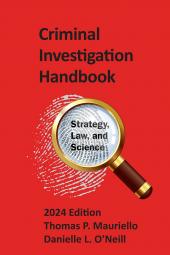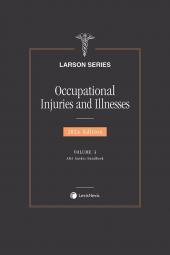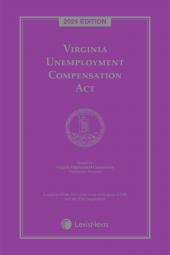Criminal Investigation Handbook
Select a format
 International Order Inquiry
International Order Inquiry
Select subscription type
Terms & conditions
Subscribers receive the product(s) listed on the Order Form and any Updates made available during the annual subscription period. Shipping and handling fees are not included in the annual price.
Subscribers are advised of the number of Updates that were made to the particular publication the prior year. The number of Updates may vary due to developments in the law and other publishing issues, but subscribers may use this as a rough estimate of future shipments. Subscribers may call Customer Support at 800-833-9844 for additional information.
Subscribers may cancel this subscription by: calling Customer Support at 800-833-9844; emailing customer.support@lexisnexis.com; or returning the invoice marked "CANCEL".
If subscribers cancel within 30 days after the product is ordered or received and return the product at their expense, then they will receive a full credit of the price for the annual subscription.
If subscribers cancel between 31 and 60 days after the invoice date and return the product at their expense, then they will receive a 5/6th credit of the price for the annual subscription. No credit will be given for cancellations more than 60 days after the invoice date. To receive any credit, subscriber must return all product(s) shipped during the year at their expense within the applicable cancellation period listed above.
The total price includes the product(s) listed in the Order Form and any Updates for a limited period (minimum period of 30 days) after the order is placed ("Order Window"). Shipping and handling fees are not included in the grand total price.
All shipments may be returned, at subscribers' expense, for full credit of the Price within 30 days of receipt.
Shipments may not be returned, and no credits will be issued, more than 30 days after receipt.
After the Order Window, subscribers will receive notice of Updates along with the then-current grand total price and order process as Updates become available. Subscribers will only be shipped those Updates they specifically request.
Product description
View a sample of this title using the ReadNow feature
Criminal Investigation Handbook has been written for all those responsible for conducting criminal investigations (including the police, federal special agents and investigators, governmental administration and security agencies, prosecutors, defense attorneys, etc) and those who need to understand the activities of the investigative process. These are the individuals and agencies which use these means and products of such investigations in their daily practice. It provides them with practical advice on how best to prepare cases for ultimate presentation in court and makes them aware of the most likely points at which their evidence is vulnerable and subject to attack. Also included is the listing of the new availability of crime statistics from the FBI’s Crime Data Explorer (CDE) which is the digital front door for UCR data.
The Handbook answers not only the basic interrogatives of the investigation field: WHO … WHAT … WHERE … WHEN … and HOW, but, like no other treatise, Criminal Investigation Handbook also further expands and answers the most important question when a criminal investigation is started: WHY?...
• WHY should the investigative report be all-encompassing?
• WHY should the investigator consider the actions of the entire criminal justice system and look at the investigation as a process?
• WHY does the investigator need to understand the value and principles of the forensic sciences and the capabilities of the crime laboratory?
• WHY should the investigation begin with a strategic view of the end of the judicial process?
This Handbook combines the in-depth analysis of a treatise with the how-to and why-to assistance of a practical guide. It aspires to be both substantive and practical. Suggestions are made herein as to the most effective way to proceed in investigating a criminal case, what evidence is the most probative not only from the perspective of satisfying the essential elements of the crime charged, but also from the point of view of convincing the judge or jury that the accused is guilty of committing, aiding or abetting, or soliciting the commission of that crime.
The Handbook focuses on:
• Investigative Protocol
• Collecting, Preparing and Preserving Physical Evidence – including the most recent fingerprint examination techniques and forensic science
• Interviewing Witnesses
• Documenting the Investigation and the Investigation Case File
• Scientific Laboratory Examination Requirements
• Forensic Interviewing of Suspects
• Identifying and Eliminating Weaknesses in the Investigative Process
• Current Uniformed Crime Report (UCR) Statistics
• Developing a Strategic View of the Whole Investigative Process
eBooks, CDs, downloadable content, and software purchases are noncancelable, nonrefundable and nonreturnable. Click here for more information about LexisNexis eBooks. The eBook versions of this title may feature links to Lexis+® for further legal research options. A valid subscription to Lexis+® is required to access this content.
Table of contents
Part 1 GENERAL PRINCIPLES IN CRIMINAL INVESTIGATION
Chapter 1: Introduction
Chapter 2: Constitutional Aspects of Criminal Investigation
Part 2 CRIMINAL INVESTIGATION PROCESS
Chapter 3: Crime Scene Investigation
Chapter 4: Interviewing Witnesses at the Crime Scene
Chapter 5: Documenting the Investigation—The Report
Chapter 6: Identification, Collection and Processing of Physical Evidence
Chapter 7: Fingerprints
Chapter 8: Firearms Identification
Chapter 9: Tool Marks and Impressions
Chapter 10: Questioned Document Evidence
Chapter 11: Transfer and Trace Evidence
Chapter 12: Forensic Interviewing and Interrogation
Chapter 13: Computer Forensics
Part 3 INVESTIGATION OF SPECIFIC CRIMES
Chapter 14: Property Crimes: Theft and Burglary Investigations
Chapter 15: Rape and Other Sexual Offenses
Chapter 16: Criminal Death Investigations
Chapter 17: Drug Investigations
Chapter 18: Robbery Investigations
Chapter 19: Investigation of White Collar Crimes and Organized Crime
Chapter 20: Terrorism Investigation and Homeland Security
Chapter 21: Arson Investigations
APPENDIX 1: The Simpson–Goldman Murder Investigation—Analysis of the Investigative Issues
APPENDIX 2: The 2002 Washington, D.C. Area Sniper Shootings—A Case Analysis of the Multi-Jurisdictional Investigation
 Lexis Nexis
Lexis Nexis 


